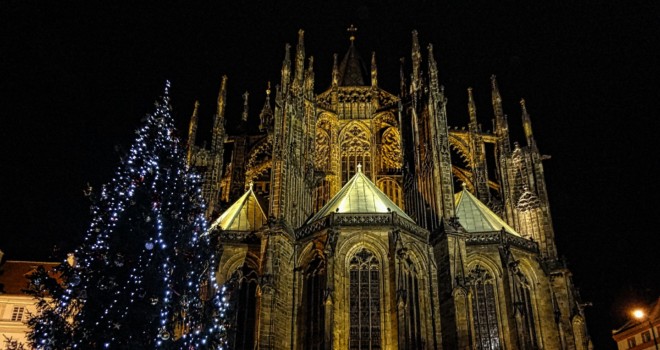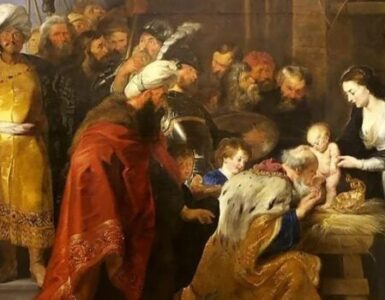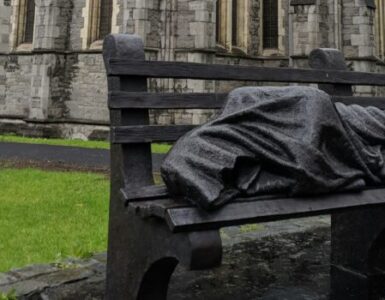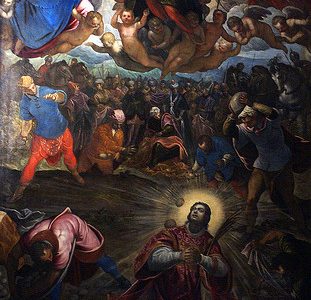Saint Robert Southwell, SJ, the English Jesuit priest, martyred during the reign of Queen Elizabeth I, was a brilliant poet whose poetry seems inspired by his insights from prayer. Saint Robert Southwell lived in a time of great persecution of Catholics in England. It was illegal for Catholics to attend Mass and they were required to attend the Church of England’s religious services; if they did not, they had to pay large fines or go to prison.
It was also illegal to be a priest in England. The 1585 Act Against Jesuits and Seminary Priests made all priests in England guilty of treason, and it became a crime for anyone to help them. However, there were still courageous young men who studied in seminaries abroad and returned to England as missionaries, knowing they would be captured, imprisoned, tortured, and killed—just for being priests. Saint Robert Southwell was one of those heroic priests. He left England at age fourteen to attend the English College in Douai, Flanders, and was admitted to the Society of Jesus in 1578 at age seventeen.
In 1584, Southwell was ordained a priest. He was sent as a missionary to England on May 8, 1586, where he celebrated Mass, heard confessions, visited Catholics in prisons, trained new missionary priests, and wrote books and poetry to encourage Catholics to remain faithful. He was arrested in 1592, was tortured several times, and imprisoned in the Tower of London for almost three years. Robert Southwell was martyred on February 21, 1595, and was canonized by the Church as one of the Forty Martyrs of England and Wales in 1970.
In his Nativity poems, Saint Robert Southwell wrote about his love for the Infant Jesus, Jesus’ love for us, and the amazing meaning of His Incarnation—even though Jesus came to us as a baby, He was still powerful because of His Divinity. This Christmas Season is an ideal time for Catholics to read Saint Robert’s poems on the Infant Jesus.
“The Burning Babe” may be Saint Robert Southwell’s most famous poem. It begins with a vision of the baby Jesus on a cold winter’s day, Christmas day. Jesus glows brightly with the warmth of His love, but crying, says, “Yet none approach to warm their hearts/Or feel my fire, but I.” Although written many years before Jesus’ revelations of His Sacred Heart to Saint Margaret Mary, the imagery and message are similar to the Sacred Heart devotion and the words of the Litany referring to Jesus’ Sacred Heart as a “burning furnace of charity.”
“New Heaven, New War” is set in the stable of Bethlehem, where angels honor and care for the baby Jesus, in his new earthly home. Although seemingly helpless as a baby in His human nature, Jesus is powerful in His Divine nature, and has come to defeat the forces of evil. “This little Babe so few days old, /Is come to rifle Satan’s fold;… For in this weak unarmed wise, /The gates of hell he will surprise.”
“New Prince, New Pomp,” also set in the stable of Bethlehem, describes the way Jesus’ Divinity is hidden in His Incarnation. He appears to be an ordinary baby, born to poor parents, having to stay in a stable with animals for shelter. However, “This stable is a Prince’s court, /This crib his chair of state…” This baby is our God, and so Saint Robert tells us, “Do homage to thy King.”
“The Nativity of Christ” shows that Jesus’ Incarnation changes our lives forever. Saint Robert says to the readers:
“O dying soul, behold your living spring;
O dazzled eyes, behold your sun of grace…Up, heavy hearts with joy your joy embrace
From death, from dark, from deafness, from despairs
This life, this light, this Word, this joy repairs.”
The poet explains that the greatest gift God gives us is Himself, and in return, we need to give Him ourselves. Saint Robert emphasized his own complete offering of himself to God. “God is my gift, himself he freely gave me:/God’s gift am I, and none but God shall have me.” The last stanza shows the significance of the Baby Jesus having a manger—where animals eat—for his bed, as He would later give Himself to us under the appearance of bread in the Eucharist.
“A Child My Choice” is a poem expressing Saint Robert’s love for the Child Jesus. He wrote,
“I praise him most, I love him best, all praise and love is his,
While him I love, in him I live, and cannot live amiss.”
In this poem too, he wrote on the mystery of Jesus as a young child who is also God, and what His Incarnation means for us.
“Though young, yet wise; though small, yet strong; though man, yet God he is:
As wise he knows; as strong he can: as God he loves to bliss.
His knowledge rules; his strength defends; his love doth cherish all;
His birth our Joy; his life our light; his death our end of thrall.”
The poem concludes with a prayer to the Child Jesus to “Correct my faults, protect my life, direct me when I die.”
Saint Robert Southwell’s beautiful poems gave hope to the persecuted Catholics of England. His Christmas poems can inspire and encourage us today as well to stay close to Jesus during this Christmas season and always.
✠
Photo by Mike Swigunski on Unsplash














